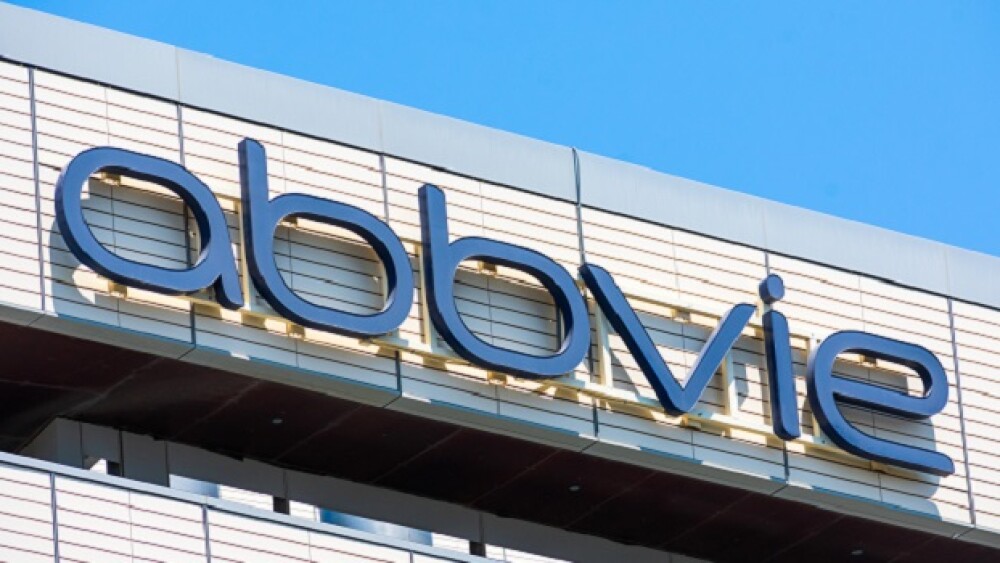With Friday’s approval, Epkinly edges out Roche’s bi-specific antibody glofitamab, which is also being proposed for diffuse large B-cell lymphoma.
Pictured: Blue and white AbbVie logo on building/Michael Vi/Adobe Stock
Friday, AbbVie and Genmab won the FDA’s greenlight for their bi-specific T-cell engager epcoritamab-bysp, now with the brand name Epkinly, for the treatment of relapsed or refractory diffuse large B-cell lymphoma (DLBCL) in adults.
Epkinly was approved under the regulator’s accelerated pathway and is also indicated for DLBCL due to indolent lymphoma and high-grade B-cell lymphoma, after at least two lines of systemic treatment.
Epkinly’s label bears a boxed warning for cytokine release syndrome and immune effector cell-associated neurotoxicity syndrome, both of which can become life-threatening. The DLBCL treatment might also lead to serious or fatal infections, as well as carry a risk of cytopenias and embryo-fetal toxicity.
Friday’s approval is based on response rate and durability of response data from the pivotal Phase I/II open-label EPCORE NHL-1 trial. Epkinly treatment led to an overall response rate of 61% and a complete response rate of 38%. The median duration of response was 15.6 months in relapsed or refractory DLBCL patients who had been heavily pretreated.
To keep Epkinly on the market, AbbVie and Genmab need to run a confirmatory trial to verify the clinical benefit of their T-cell engager.
Epkinly works by binding to both the CD3 protein on T cells and CD20 protein commonly found on B cells. CD20 is a well-validated target in B-cell malignancies. Epkinly exploits this by bridging the malignant B-cells with T-cells, which allow the cancer killers to induce inflammation in the vicinity of the cancer cells and cause its destruction.
According to the companies’ press announcement, Epkinly is the first subcutaneous bi-specific antibody for DLBCL.
AbbVie and Genmab jointly developed Epkiny under a June 2020 cancer collaboration, which involved a $750 million upfront payment from AbbVie, along with the promise of up to $3.15 billion in potential milestones.
Blood Cancer Competition
With Friday’s approval, Epkinly edges out Roche’s own bi-specific antibody glofitamab, also being proposed for DLBCL. The FDA accepted glofitamab’s Biologics License Application in January 2023 and granted the therapy its Priority Review designation. The agency is set to release a verdict on July 1.
In May 2022, Genentech, the Roche subsidiary responsible for developing glofitamab, announced positive data for the bi-specific engager in aggressive relapsed or refractory DLBCL. In the Phase II NP30179 expansion study, glofitamab had a 39.4% complete response rate, slightly better than Epkinly’s showing in EPCORE NHL-1. Overall response, however, was lower, at 51.6% after glofitamab treatment.
However, in the absence of head-to-head trials, direct comparison of response data should be done with caution and cannot be used to draw definitive conclusions about either drug’s efficacy.
Both Epkinly and glofitamab are also being assessed for the first-line treatment of DLBCL. In this setting, Roche has a slight edge over AbbVie and Genmab, with the former’s Polivy (polatuzumab vedotin-piiq) winning the FDA’s approval last month as part of a five-drug regimen including Rituxan (rituximab), cyclophosphamide, doxorubicin and prednisone.
Polivy is now fully approved in first-line DLBCL, following its accelerated approval in June 2019.
Tristan Manalac is an independent science writer based in metro Manila, Philippines. He can be reached at tristan@tristanmanalac.com or tristan.manalac@biospace.com.






